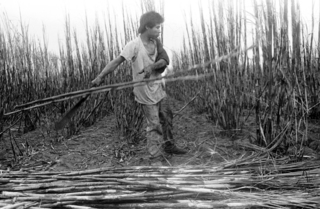Death on the sugar cane road
"They killed my grand son!"
By Egon Heck
28/06/2010
Carlito calls with a faltering and indignant voice: "They killed my grandson and tossed him away like a dog!” “Easy, Carlitos, help me to understand what happened!"
"My grandson Julio, 16, was practically stolen to be taken by the cabeçante (person responsible for regimenting a group of workers) to go cut cane. He had his uncle’s ID. That was Saturday night. In the morning I received a call from the cabeçante saying something very bad had happened: my grandson Julio had been thrown from the bus and died. His body was taken to Nioaque and then to the indigenous land of Caarapó. Only after that the body arrived here for us to bury. No explanation was given. It cannot go on like this. He died like an animal …".
Faced with this story and the insistent request for help, I understood that, off course, that he wanted to know the truth. He said he did not believe that his grandson would have thrown himself from the bathroom window of the bus. The bus that was taking the indigenous workers to cut sugar cane at the Santa Olinda sugar cane mill in the Quebra Coco district, in the municipality of Sidrolândia. He told that the death certificate stated that as a cause, but he believed it impossible.
After trying to learn a little more details, I felt that he was discomfited, seeking help to elucidate one more crime among the many that will probably continue to be shrouded by the white smoke of the mills and the thick veil of impunity on the sugar plantation roads. I said I would report to our attorney, in whom the community has full confidence, to help them see what steps should be taken in the case. I also suggested that immediate help could be given by federal prosecutors [of the Federal Public Ministry (MPF)], and perhaps, by the Federal Department of Indigenous Affairs (Funai).
The death, allegedly a suicide, of Julio Rocha Goncalves, Kaiowá Guarani, 16, son of Arnaldo Gonçalves Rocha and Macilene Benites, residents in the village of Passo Piraju, perhaps will only be one more number swelling the statistics of death by homicide, suicide or murder per week.
 ”Cane does not fool me”. This was the name of a seminar organized by social movements in Campo Grande, a few years ago, given the euphoria of the expansionism of the sugarcane industry in Mato Grosso do Sul and Brazil. Enthusiastically announced the heaven of development without even going through purgatory.
”Cane does not fool me”. This was the name of a seminar organized by social movements in Campo Grande, a few years ago, given the euphoria of the expansionism of the sugarcane industry in Mato Grosso do Sul and Brazil. Enthusiastically announced the heaven of development without even going through purgatory.
The sweet ethanol flagship was steered by the state’s governor and, as promoter, the President of the Republic himself. Lula. He spoke of the 60 plants that were to explode in the green sea of sugar cane. It was the excited feast of the great multinational capital.
Small obstacles, such as the demarcation of Guarani Kiaowá lands, in whose traditional lands several of these plants were being built, did not represent great concerns, because the state government and the powerful tentacles of agribusiness would take care of this.
In addition to this, the end was foreseen of the extenuating and semi-slave labor of planting and cutting cane by indigenous laborers, northeasterners and caboclos of the region. Powerful machines, each one dispensing 80 -100 workers, would enter into the fields to make their goal, applauded by the "heroic" lords of agribusiness.
Everything indicated blue skies. Finally, Mato Grosso do Sul would be on track towards development. At the roadside, in the cane fields and in the villages continue to be planted the crosses for Julio, João and Maria. It is the bitter price of sugar and ethanol.

